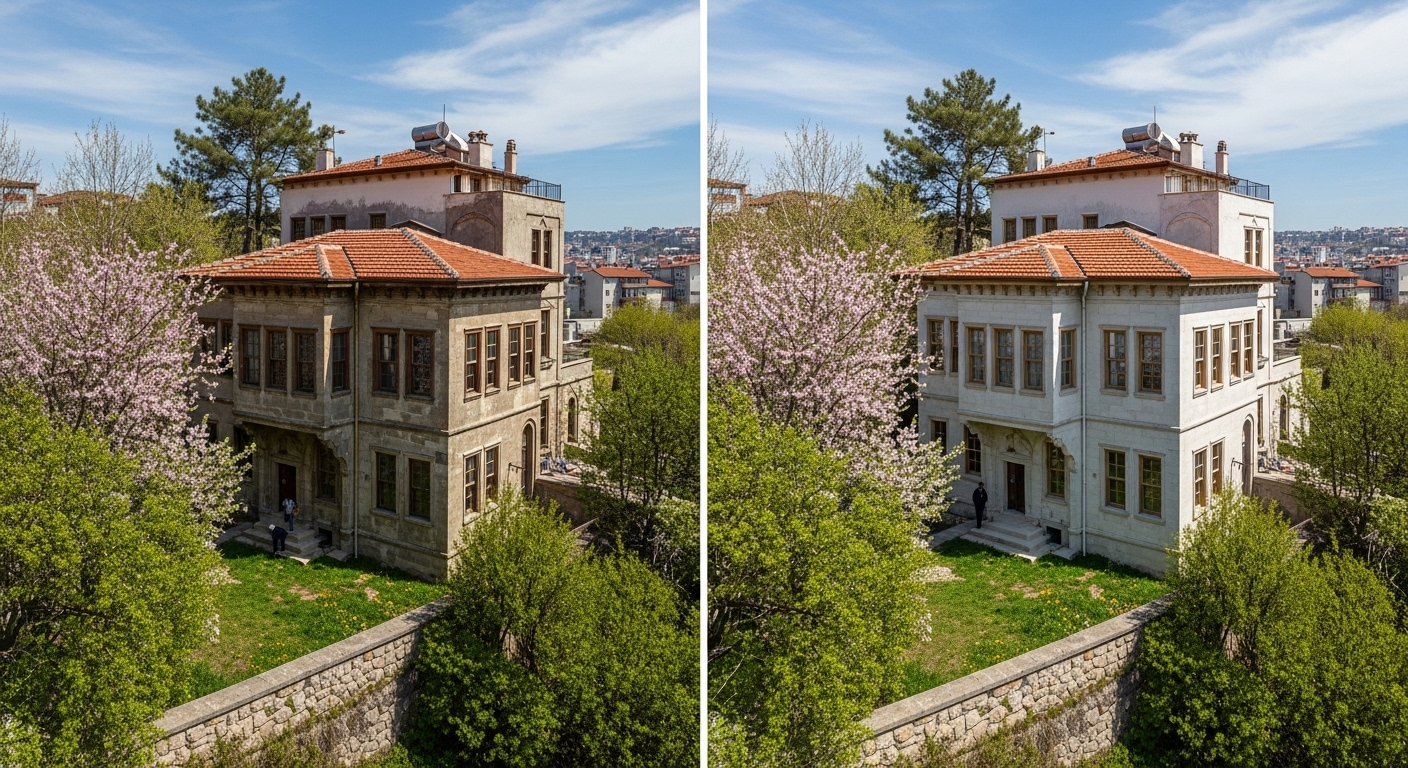Property Renovation in Turkey: A Complete Guide for Homeowners and Investors
Discover how to buy, renovate, and profit from property renovation in Turkey. A step-by-step guide for homeowners and investors!

Introduction
Renovating property in Turkey has rapidly become one of the smartest moves for homeowners and international investors alike. Why? Well, imagine transforming an old stone house on the Aegean coast into a luxury holiday villa or turning a dated Istanbul apartment into a chic modern rental. Sounds dreamy, right? That’s exactly what’s attracting savvy investors to Turkey’s property market.
Turkey offers a unique blend of affordability, historical charm, and untapped renovation potential. With stunning coastlines, vibrant cities, and a welcoming culture, it’s no wonder more people are jumping on the renovation bandwagon. From quaint village homes to urban flats, the possibilities are endless—and so are the profits if you play your cards right.
In this guide, we’ll break down every step, from understanding the market and legal aspects to budgeting, hiring trustworthy contractors, and adding that perfect Turkish touch to your renovation project. Whether you’re planning to retire in your dream home by the Mediterranean or flip properties for a tidy profit, stick with me as we dive deep into the nuts and bolts of property renovation in Turkey.
Understanding the Turkish Property Market
Before you swing a hammer or call an architect, it’s crucial to understand the lay of the land. Turkey’s real estate market has seen significant shifts over the past decade. Cities like Istanbul, Antalya, Bodrum, and Fethiye have become magnets for expats and investors looking to renovate and profit.
One reason the Turkish property market is so enticing is the relatively lower cost compared to other Mediterranean hotspots like Spain or Italy. A rundown villa by the Aegean Sea might cost you half the price of a similar property on the Italian Riviera. But don’t be fooled—prices have been steadily climbing, especially in sought-after regions.
Let’s break down some key trends:
Urban Revitalization: Istanbul is buzzing with urban regeneration projects. Old neighborhoods are transforming into trendy hubs, and investors are racing to restore historical buildings.
Coastal Town Boom: Places like Bodrum, Marmaris, and Antalya are favorites for summer homes and holiday rentals. Renovating an old stone house here can double its value.
Rural Revival: Even rural villages see foreign buyers snapping up old farmhouses and turning them into boutique guesthouses or retirement escapes.
Knowing where to buy and renovate is half the battle. Research market prices, talk to local agents, and spend time in the area before committing. A well-chosen location is the golden ticket to a profitable renovation project in Turkey.
Benefits of Renovating Property in Turkey
Renovating in Turkey isn’t just about giving an old building a facelift—it’s about unlocking hidden potential. Let’s look at what makes it such an appealing venture.
1. Value Appreciation:
A carefully planned renovation can dramatically increase a property’s market value. Restoring traditional Ottoman features, adding modern comforts, or expanding living spaces instantly boost appeal and price.
2. High Rental Yields:
Renovated properties in tourist hotspots generate attractive rental income, especially during the peak summer season. Many expats buy fixer-uppers near the coast, renovate them tastefully, and rent them out on platforms like Airbnb.
3. Personal Satisfaction:
For many, it’s not just business—it’s personal. There’s immense joy in preserving a piece of history or crafting a holiday home exactly to your taste.
4. Community and Lifestyle:
Renovating and settling down in Turkey often means becoming part of a tight-knit community. Locals appreciate foreigners restoring neglected homes, breathing new life into villages and towns.
Whether you’re chasing profits or a dream lifestyle under the sun, property renovation in Turkey offers both financial and emotional rewards.
Legal Considerations for Renovation
Before you start knocking down walls or repainting facades, you need to get your paperwork in order. Turkey has strict building codes and preservation rules, especially for historical properties.
1. Permits and Permissions:
Major renovations—like structural changes, extensions, or restoring a protected building—require approval from local municipalities. Failing to get permits can lead to hefty fines or even demolition orders.
2. Working with Local Authorities:
Navigating Turkish bureaucracy can be tricky if you don’t speak the language or understand local processes. Hiring a local lawyer or consultant is highly recommended. They’ll handle permit applications, coordinate with the municipality, and ensure your project stays on the right side of the law.
3. Zoning and Restrictions:
Certain areas, particularly heritage sites, have additional restrictions. For example, you may not be allowed to alter the exterior look of a traditional house in a historical neighborhood. Always double-check zoning laws to avoid surprises.
Taking care of the legal side upfront saves time, money, and stress. Trust me—you don’t want your dream renovation turning into a bureaucratic nightmare!
Finding the Right Property to Renovate
Finding that diamond in the rough is both an art and a science. Here’s how to do it smartly:
1. Look for Potential:
Focus on properties with solid structural bones. Cracked walls or leaking roofs can be fixed, but severe foundation problems often mean runaway costs.
2. Location, Location, Location:
This age-old real estate mantra holds true in Turkey too. Properties close to tourist spots, beaches, or cultural sites tend to appreciate faster.
3. Hidden Costs:
Always budget for the unexpected. Old houses might hide plumbing issues, electrical faults, or termite damage. It’s wise to hire a local surveyor to inspect the property before you sign anything.
4. Talk to Locals:
Sometimes the best deals aren’t listed online. Chat with neighbors or local shopkeepers—they might know an elderly owner looking to sell quietly.
Finding the right fixer-upper can feel like a treasure hunt. Be patient, do your homework, and soon you’ll be holding the keys to your future dream home or profitable rental.
Planning Your Renovation Project
Once you’ve found the perfect property, it’s time to plan your renovation down to the smallest detail. This step can make or break your project—seriously. A well-laid plan saves you from unexpected costs, delays, and those hair-pulling moments when you realize you’ve blown your budget on imported tiles you didn’t actually need.
1. Set a Realistic Budget:
Start by listing all expected costs: structural repairs, roofing, plumbing, electrical work, interior design, permits, labor, and finishing touches like furniture and decor. Then, add at least 20% extra as a buffer. In Turkey, unexpected expenses pop up more often than not, especially with older properties. Also, consider the currency exchange rate fluctuations if you’re budgeting in foreign currency.
2. Create a Timeline:
How long will your renovation take? Be realistic—renovating an old stone house might take anywhere from three months to a year. Break the project into phases: demolition, structural work, interiors, exterior finishes, and landscaping. A detailed timeline keeps your contractors on track and you stress-free.
3. DIY vs. Hiring Professionals:
Some expats dream of doing everything themselves to save money. While painting walls or adding decor can be a fun DIY project, major structural work is best left to local experts who know Turkish materials, weather conditions, and building codes.
4. Get Multiple Quotes:
Always get at least three quotes for each part of the project—whether it’s plumbing, roofing, or landscaping. This gives you bargaining power and helps avoid overpaying.
A solid plan keeps your renovation running smoothly. Remember: measure twice, cut once—this old saying couldn’t be truer when renovating in Turkey.
Hiring Contractors and Professionals in Turkey
Hiring the right people is half the battle won. A trustworthy contractor can turn your vision into reality, while a bad one can leave you with a half-finished ruin and a drained bank account. So, how do you find the good ones?
1. Ask for Recommendations:
Word-of-mouth is gold in Turkey. Talk to other expats, local real estate agents, or even neighbors. They’ll steer you toward reliable builders, electricians, and plumbers who have proven track records.
2. Check Credentials:
Don’t just take their word for it. Ask to see licenses, previous work, and references. Visit a couple of their completed projects if possible—it’s the best way to gauge their quality.
3. Contracts are a Must:
Never rely on a handshake deal. Draft a clear contract in both Turkish and your language (get a certified translator if needed). It should include payment terms, timelines, materials, and penalties for delays.
4. Communication is Key:
Most contractors speak limited English. Use translation apps, hire a bilingual project manager, or brush up on essential Turkish construction terms. Clear communication prevents misunderstandings that can cost you dearly.
5. Payment Terms:
Avoid paying large sums upfront. Instead, break payments into milestones—like a deposit, mid-project payment, and final installment after satisfactory completion.
Good professionals make your life a breeze and your renovation a joy. Take your time to find the right team—it’s worth every second.
Design Trends in Turkish Property Renovations
Here comes the fun part: turning your renovated space into a stunning home that blends Turkish charm with modern comfort.
1. Traditional Touches:
Many renovators love keeping authentic elements: stone walls, wooden beams, and intricate tilework. Preserving these features not only maintains the property’s character but also increases its market value.
2. Modern Upgrades:
Pair old-world charm with modern amenities. Open-plan kitchens, energy-efficient windows, underfloor heating, and smart home systems are popular among buyers and renters alike.
3. Indoor-Outdoor Living:
Turkey’s climate begs for courtyards, terraces, and rooftop patios. Many renovations include expanding outdoor spaces—think pergolas covered in grapevines, BBQ areas, and cozy nooks with sea views.
4. Sustainable Choices:
Eco-friendly renovations are on the rise. Solar panels, rainwater harvesting, and natural insulation materials not only lower your utility bills but also appeal to environmentally conscious buyers.
5. Neutral Palettes with Pops of Color:
Soft, earthy tones dominate modern Turkish interiors, often accented with bold turquoise, deep blues, or bright textiles inspired by traditional Turkish kilims.
Mixing old and new gives your property a unique edge—whether it’s a city apartment or a village stone house.
Cost Breakdown of Renovation in Turkey
One question everyone asks: How much will this cost me? The answer: it depends—but here’s a ballpark idea to help you budget wisely.
1. Average Costs:
Basic renovation (painting, minor repairs): €100–€300 per square meter.
Mid-range renovation (kitchen and bathroom updates, flooring): €300–€600 per square meter.
High-end renovation (structural changes, luxury finishes): €600–€1,000+ per square meter.
2. Labor Costs:
Labor in Turkey is generally cheaper than in Western Europe, but prices vary by region. Istanbul and tourist hotspots tend to cost more.
3. Hidden Expenses:
Always account for permits, architectural plans, utility connections, and unexpected repairs—these can add up fast.
4. Financing Options:
Most renovations are self-financed, but some local banks offer renovation loans to foreign buyers. It’s wise to consult a financial advisor familiar with Turkish banking.
Use this breakdown as a guide, but remember: every project is unique. Always overestimate rather than underestimate your budget—you’ll thank yourself later.
Challenges and Risks of Renovating in Turkey
Renovating property in Turkey can be incredibly rewarding, but it’s not without its hurdles.
1. Hidden Problems:
Many old houses have hidden issues—like weak foundations, outdated plumbing, or insect damage. A thorough inspection helps avoid nasty surprises.
2. Language and Cultural Barriers:
Miscommunication can delay projects and inflate costs. Hiring bilingual contractors or a local project manager can bridge the gap.
3. Bureaucracy:
Dealing with permits and municipal approvals can be time-consuming. Expect some paperwork delays and factor them into your timeline.
4. Financial Risks:
Currency fluctuations and unexpected costs can stretch your budget. Always have a contingency fund.
5. Seasonal Slowdowns:
In coastal towns, work often slows down during hot summers and public holidays. Plan accordingly to avoid delays.
Despite the challenges, thousands of foreigners successfully renovate in Turkey each year. Stay patient, flexible, and well-prepared—you’ll come out ahead.
Selling or Renting Out Your Renovated Property
Once your project is complete, you have two lucrative options: sell it for a profit or rent it out for steady income. Here’s how to make the most of both.
1. Selling for Profit:
A tastefully renovated property in a desirable location can fetch double or triple your initial investment. High-quality finishes, modern amenities, and preserved original features attract foreign buyers and locals alike. To sell quickly:
Hire a reputable local agent familiar with international buyers.
Get professional photos taken—presentation matters.
Set a competitive but realistic price based on market trends.
2. Renting for Income:
Tourist towns like Bodrum, Antalya, and Alanya have strong short-term rental demand, especially during summer. Platforms like Airbnb, Booking.com, and local vacation rental sites help you reach a global audience.
Tips for success:
Offer unique touches like a welcome basket of local delicacies or guided tours.
Keep your property well-maintained and respond to guest reviews quickly.
Consider hiring a local property manager if you live abroad—they handle bookings, cleaning, and guest check-ins.
3. Long-Term Rentals:
In cities like Istanbul, renovated apartments attract young professionals and expats looking for quality housing. Long-term rentals mean less hassle than short-term stays and provide steady income year-round.
Whatever route you choose, a beautifully renovated property in Turkey can become a stable income source or a profitable flip. Just make sure your pricing aligns with the local market—and don’t underestimate the power of good marketing!
Tax Implications and Financial Considerations
Dealing with taxes may not be glamorous, but it’s vital to protect your investment and avoid unpleasant surprises.
1. Property Taxes:
Turkey’s annual property tax is relatively low compared to Europe. It usually ranges from 0.1% to 0.6% of the property’s declared value, depending on the location and type of property.
2. Rental Income Tax:
If you earn rental income, you must declare it to the Turkish tax office. The tax rate varies based on your total income, but generally ranges from 15% to 40%. Many expats hire an accountant to handle this.
3. Capital Gains Tax:
If you sell your renovated property within five years of purchase, you may owe capital gains tax on your profit. After five years, the sale is tax-free.
4. Double Taxation Agreements:
Turkey has agreements with many countries to prevent you from being taxed twice on the same income. Check with a tax advisor in your home country to be sure.
5. Changing Regulations:
Turkish property laws can change, so stay updated on tax rates and rules. A local lawyer or accountant can keep you informed and help you file everything correctly.
Paying the right taxes ensures your investment stays profitable and trouble-free in the long run.
Tips for Foreigners Renovating in Turkey
Turkey is wonderfully welcoming, but renovating here has its unique quirks—especially for foreigners. Keep these tips in mind for a smoother experience:
1. Embrace the Culture:
Turks value relationships and trust. Be patient, polite, and take time to build rapport with your contractors, neighbors, and local officials.
2. Learn Basic Turkish Phrases:
Even a few words break the ice and earn you respect. Phrases like “Merhaba” (hello), “Teşekkür ederim” (thank you), and “Ne kadar?” (how much?) go a long way.
3. Hire a Local Project Manager:
If you don’t live in Turkey full-time, a trustworthy local manager is a lifesaver. They handle day-to-day oversight, deal with contractors, and update you regularly.
4. Respect Local Customs:
If your property is in a small village, be mindful of local traditions—like keeping noise levels down during prayer times or avoiding work during major holidays.
5. Join Expat Groups:
Many towns have active expat communities where you can swap renovation tips, share contacts, and even find trusted builders through recommendations.
Renovating abroad can feel daunting at first, but with the right mindset and preparation, you’ll navigate it like a pro—and probably make lifelong friends along the way.
Conclusion
Renovating property in Turkey isn’t just about bricks and mortar—it’s about creating something beautiful, investing wisely, and embracing a new lifestyle. From dreamy coastal villas to urban heritage apartments, the opportunities are endless if you plan well, hire the right team, and respect the local way of doing things.
Whether you aim to flip for profit, rent for steady income, or enjoy your slice of Turkish paradise, take your time, do your research, and don’t rush the process. Many have done it before you—and they’ll all tell you it’s one of the most rewarding decisions they’ve ever made.
So, are you ready to turn that crumbling stone house or dated apartment into your Turkish dream home? The adventure starts now—grab your plans, your courage, and maybe a strong cup of Turkish coffee. Happy renovating!
Have Question Or Suggestion ?
Please Share Your Thought, To Make It Real


